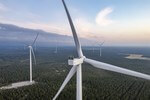News Release from WindEurope
Wind Industry Profile of
10/02/2010
USA - America should prioritise offshore wind power, study finds
Referring to climate change mitigation and other environmental benefits, the report also found that offshore wind power is much safer than nuclear power, natural gas, coal and oil.
Harnessing offshore wind energy would be cheaper for the U.S. than continuing to drill for oil and gas off the Atlantic coast and it would also create more jobs, according to a new report issued this week.
An analysis by Oceana, an international organisation focused on ocean conservation, also found that a modest investment in offshore wind turbines could supply almost half the current electricity generation on the East Coast.
The report, called “Untapped Wealth: The Potential of Offshore Energy to Deliver Clean, Affordable Energy and Jobs,” noted that the disastrous consequences of the April oil rig explosion and leak in the Gulf of Mexico underscore the high costs of heavy U.S. reliance on fossil fuels.
The report found that Delaware, Massachusetts and North Carolina could generate enough electricity from offshore wind farm to equal current electricity generation, entirely eliminating the need for fossil fuel based electric generation.
It also found that New Jersey, Virginia and South Carolina could supply 92%, 83% and 64% of their current electricity generation with offshore wind power, respectively.
In terms of employment, the study revealed that Atlantic offshore wind farm developments could create between 133,000 and 212,000 jobs annually in the U.S., more than three times the jobs estimated from proposed future expansion of offshore oil and gas drilling.
In addition, the report noted that in the south Atlantic region of the U.S., offshore wind energy could heat more homes than offshore oil and natural gas resources combined, for less than half the price.
Referring to climate change mitigation and other environmental benefits, the report also found that offshore wind power is much safer than nuclear power, natural gas, coal and oil.
“Our research revealed that harnessing offshore wind power in Atlantic waters is a much more cost-effective way to generate energy than oil and gas drilling,” Jacqueline Savitz, Oceana senior campaign director and analysis co-author, said in a press release issued in Washington, D.C. “If we can get more energy for less money, create more jobs and protect our environment from spills, why not choose offshore wind over oil and gas?”
Senator Thomas Carper said that the analysis offers further proof of the many benefits of offshore wind power. “The Oceana report confirms what I have been saying for a long time: the development of offshore wind farm means reliable energy, good paying American jobs and independence from fuels that pollute our air and drain our economy.”
The report recommends that the U.S. begin to transition away from offshore fossil fuel development now by eliminating federal subsidies for fossil fuels and re-directing those funds to renewable energy development and energy efficiency programs, stop all new offshore drilling for oil and gas, increase and make permanent the production and investment tax credit for wind energy, and increase long-term demand for and supply of renewable energy through a Renewable Electricity Standard.
“Investment in wind power off America’s Atlantic coast would create hundreds of thousands of good jobs and help wean us off oil, while reducing energy costs for consumers. Oceana urges policymakers and private investors to make offshore wind power development a priority,” Savitz added.
Plugin hybrid-electric vehicles, like Chevrolet’s Volt, and completely electric vehicles, like Nissan’s Leaf and THINK’s City, will begin to be sold commercially in the US within the next year. With an electrified car fleet, 127 gigawatts of offshore wind farm could power nearly twice as many electric vehicles as new offshore oil and gas development combined.
Please copy and paste the following link to view the stidy:
http://na.oceana.org/sites/default/files/reports/Offshore_Wind_Report_-_Final_1.pdf
A wind energy blog written by Chris Rose, blog.ewea.org
Harnessing offshore wind energy would be cheaper for the U.S. than continuing to drill for oil and gas off the Atlantic coast and it would also create more jobs, according to a new report issued this week.
An analysis by Oceana, an international organisation focused on ocean conservation, also found that a modest investment in offshore wind turbines could supply almost half the current electricity generation on the East Coast.
The report, called “Untapped Wealth: The Potential of Offshore Energy to Deliver Clean, Affordable Energy and Jobs,” noted that the disastrous consequences of the April oil rig explosion and leak in the Gulf of Mexico underscore the high costs of heavy U.S. reliance on fossil fuels.
The report found that Delaware, Massachusetts and North Carolina could generate enough electricity from offshore wind farm to equal current electricity generation, entirely eliminating the need for fossil fuel based electric generation.
It also found that New Jersey, Virginia and South Carolina could supply 92%, 83% and 64% of their current electricity generation with offshore wind power, respectively.
In terms of employment, the study revealed that Atlantic offshore wind farm developments could create between 133,000 and 212,000 jobs annually in the U.S., more than three times the jobs estimated from proposed future expansion of offshore oil and gas drilling.
In addition, the report noted that in the south Atlantic region of the U.S., offshore wind energy could heat more homes than offshore oil and natural gas resources combined, for less than half the price.
Referring to climate change mitigation and other environmental benefits, the report also found that offshore wind power is much safer than nuclear power, natural gas, coal and oil.
“Our research revealed that harnessing offshore wind power in Atlantic waters is a much more cost-effective way to generate energy than oil and gas drilling,” Jacqueline Savitz, Oceana senior campaign director and analysis co-author, said in a press release issued in Washington, D.C. “If we can get more energy for less money, create more jobs and protect our environment from spills, why not choose offshore wind over oil and gas?”
Senator Thomas Carper said that the analysis offers further proof of the many benefits of offshore wind power. “The Oceana report confirms what I have been saying for a long time: the development of offshore wind farm means reliable energy, good paying American jobs and independence from fuels that pollute our air and drain our economy.”
The report recommends that the U.S. begin to transition away from offshore fossil fuel development now by eliminating federal subsidies for fossil fuels and re-directing those funds to renewable energy development and energy efficiency programs, stop all new offshore drilling for oil and gas, increase and make permanent the production and investment tax credit for wind energy, and increase long-term demand for and supply of renewable energy through a Renewable Electricity Standard.
“Investment in wind power off America’s Atlantic coast would create hundreds of thousands of good jobs and help wean us off oil, while reducing energy costs for consumers. Oceana urges policymakers and private investors to make offshore wind power development a priority,” Savitz added.
Plugin hybrid-electric vehicles, like Chevrolet’s Volt, and completely electric vehicles, like Nissan’s Leaf and THINK’s City, will begin to be sold commercially in the US within the next year. With an electrified car fleet, 127 gigawatts of offshore wind farm could power nearly twice as many electric vehicles as new offshore oil and gas development combined.
Please copy and paste the following link to view the stidy:
http://na.oceana.org/sites/default/files/reports/Offshore_Wind_Report_-_Final_1.pdf
A wind energy blog written by Chris Rose, blog.ewea.org
- Source:
- European Wind Energy Association
- Author:
- Posted by Trevor Sievert, Online Editorial Journalist / Chris Rose
- Email:
- ewea@ewea.org
- Link:
- www.ewea.org/...
- Keywords:
- EWEA, wind energy, wind power, wind turbine, onshore, offshore, windmill, www.windfair.net, Trevor Sievert, ECA



























